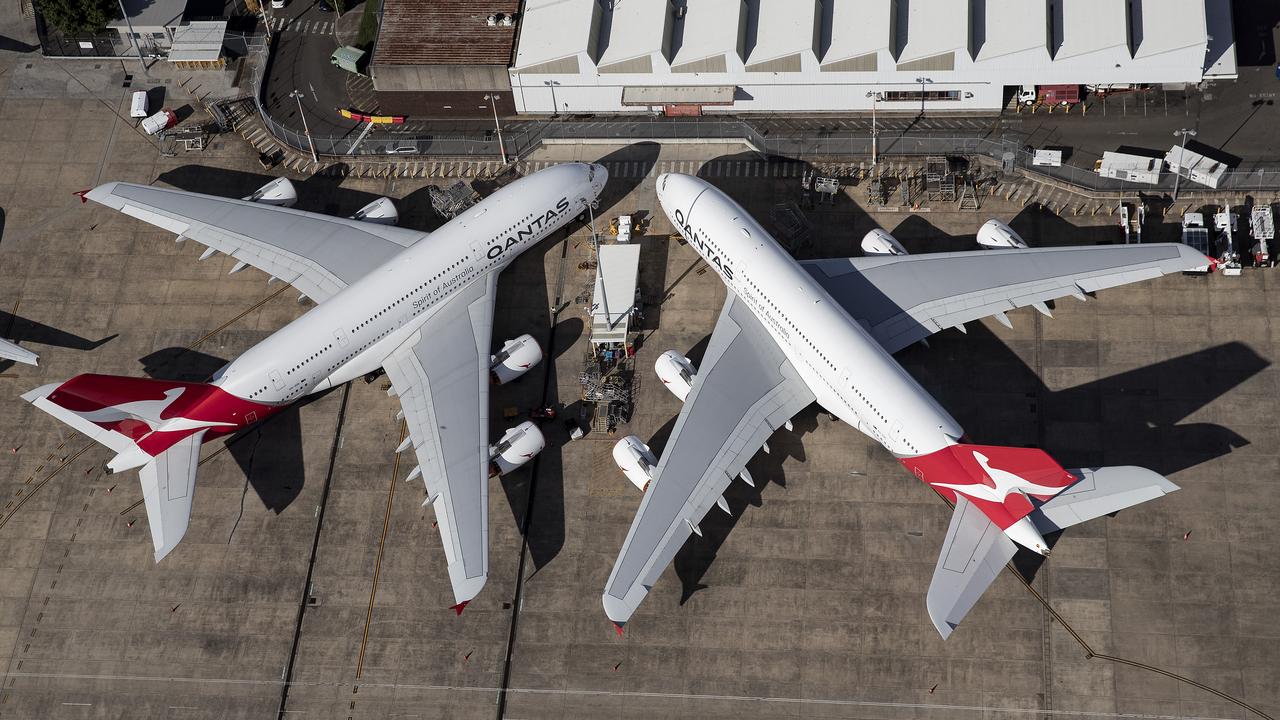Airport Coordination Australia, which manages access to Sydney Airport, says Rex handed back lucrative time slots
In an exclusive interview, the Australian, Airport Co-ordination Australia chief executive has hit back at claims about the carrier’s failure.

Business
Don't miss out on the headlines from Business. Followed categories will be added to My News.
The company that controls when airlines can take off and land at Australia’s busiest airport says those valuable time slots have nothing to do with Rex’s failure, revealing the regional carrier has actually handed back slots since March because it didn’t have enough aircraft to use them.
In an exclusive interview with The Australian, Airport Co-ordination Australia chief executive Petra Popovac said she wanted to “set the record straight” amid claims Rex and Bonza collapsed as a result of inadequate access to Sydney Airport, the nation’s biggest gateway.
Former competition watchdog chairman Rod Sims has been among those critical of slot co-ordination in Australia, claiming the lack of reform disadvantaged Rex and Bonza and the system allowed Qantas and Virgin too much influence over who was allowed in and out of Sydney.
In response to the criticism, Transport Minister Catherine King announced on Monday the government was making progress on reforms to slot management and called for tenders to appoint a new slot co-ordination manager.
Ms Popovac said slot allocation was determined independently of the board, which included representatives of Qantas and Virgin as well as the Regional Aviation Association and Sydney Airport.
“The board has nothing to do with the allocation of slots,” said Ms Popovac, who is also chair of the World Airport Slots Board.
“They’re there to ensure we’re a financially viable company, we are revenue neutral. It’s up to the slot manager, which is me, to ensure the slots are allocated in a neutral, transparent and non-discriminatory manner, which they are. We are the best slot co-ordinator in the world.”
Ms Popovac said several meetings were held with Bonza and the slots they wanted were available but they never applied for any in Sydney.
“When Rex started domestic operations (on city-to-city flights) they actually held many slots in the peak period, actually too many and they actually handed slots back this season (since March 26),” Ms Popovac said.
“There’s enough slots in Sydney (for all airlines). Rex is a good example of that, they had all the slots they required to operate to compete, so the slots weren’t the issue.”
Rex management was approached for comment.
Ms Popovac is hitting back as the Coalition declared it “absolutely imperative” that Qantas and Virgin no longer be allowed to majority own the ACA. Opposition transport spokeswoman Bridget McKenzie also called on the government to strengthen what she said were “lax” use-it-or-lose-it rules, in which an airline must use at least 80 per cent of its time slots before they can be redistributed to other airlines.
“It will now be many months before a tender system is completed and sadly too late for the hundreds of airline workers who have lost their jobs in the meantime,” Senator McKenzie said.
“Nothing the government has announced today will reduce the stranglehold Qantas and Virgin have on the domestic aviation industry.”
While Senator McKenzie has accused the government of running a protection racket for Qantas and being hesitant to tackle anti-competitive behaviour in the aviation industry, Nationals leader David Littleproud on Monday declared it was Rex’s “bad” decision to enter the capital city flight market that had “put regional aviation at risk”. He also attributed Rex’s failure to lack of slot reform.
Greens transport spokeswoman Elizabeth Watson-Brown lashed “a clear conflict of interest” in allowing Qantas and Virgin to majority own the ACA and said if Labor was serious about reform it would consider bringing slot management into government ownership.
“This would stop Qantas and Virgin keeping their stranglehold over slots and can more proactively promote competition from smaller and regional operators,” she said. “While Sydney has received the most attention, the same slot management company majority owned by Qantas and Virgin also manages slots at most of Australia’s largest airports including Brisbane, Melbourne and Perth. Ultimately, any private slots management operator is still going to prioritise their own profits over promoting more competition in the airline sector, and over connectivity for regional areas.”
Board of Airline Representatives of Australia executive director Stephen Pearse – whose members include Singapore Airlines, Qatar Airways and Air New Zealand – said international airlines were happy with the way slots were co-ordinated in Sydney.
“Slot reforms would not make much difference to the competitive landscape,” Mr Pearse said. Qantas and Virgin Australia both indicated they supported the sort of reforms announced by Ms King aligning the process more closely with the world slot guidelines.
A Qantas spokesman said regular audits of slot allocation would provide more transparency to the process and build more trust in the system. A Virgin Australia spokesman said as the only scaled competitor to Qantas and Jetstar, the airline supported measures that improved competition across the aviation sector.
“This includes how airport charges are determined and more equitable government procurement,” he said. “We look forward to further announcements as the government releases its aviation white paper.”
Originally published as Airport Coordination Australia, which manages access to Sydney Airport, says Rex handed back lucrative time slots






